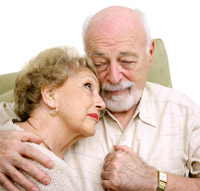Dealing with Difficult Behaviors

After a stroke, your loved one may seem like a different person. Injury to the brain from the stroke can cause changes in behavior. Your loved one may have impulsive behaviors, frustration and anger. These behaviors may lead to aggression.
What Do You Need to Know?

Your loved one may become easily upset. They may get angry and frustrated. Your loved one may be impulsive. These are common behaviors after stroke. These behaviors may last or fade in time.
Behavior changes can be hard to deal with. Try the following:
- Seek counseling or join a support group. Talking about your feelings and fears can help.
- Remind yourself that these behaviors are part of the disease. Your loved one does not have control of these behaviors.
- Think about how your loved one is feeling.
- Figure out the cause of the behavior. What was the trigger? Remove the trigger to prevent future incidents.
What Treatments Should You Discuss with Your Healthcare Team?
Discuss changes in behavior with your healthcare team. Behavior problems may have a medical cause. For example, your loved one may have pain. The healthcare team can do a behavior assessment. Work with your healthcare team to develop the best treatment plan. Treatment can range from relaxation techniques to medicines.
How Should You Handle Your Loved One's Impulsive Behavior?
Right-brain injury can cause impulsive behavior. A survivor with impulsive behavior acts before thinking. They may have poor judgment and a short attention span. Your loved one may do or say embarrassing things. Impulsive behaviors may lead to injuries. For instance, your loved one may cross the street before checking for cars.
- Make your loved one’s home as safe as possible.
- Talk to your loved one about situations they find difficult.
- Encourage your loved one to take a deep breath before taking action.
- Ignore the behavior unless it is unsafe. Try not to correct your loved one.
What Can You Do to Prevent Frustration?
Frustration is a common response to problems after a stroke. Losing one’s independence is hard to accept. Imagine needing someone’s help to bathe or to tie your shoe. Trying to complete even simple tasks can be frustrating. Below are ways you can help your loved one:
- Keep things simple. Keep the noise down.
- Allow your loved one plenty of time to do tasks.
- Keep a daily routine. Change can increase frustration.
- Find tasks that your loved one can do with little help. This will help your loved one feel valued.
- Change activities if your loved one becomes frustrated.
What Can You Do to Decrease Anger?
Stroke survivors often feel worthless and out of control. This often leads to anger. The following tips can help you decrease anger:
- Use soothing words and loving touches like a hug.
- Listen and be understanding. Try to see what is happening from your loved one’s point of view. Try to find the source of the anger.
- Praise your loved one often. Respond to anger with calmness. Try to gently distract your loved one.
- Allow your loved one time to cool down. It often helps to take a walk or exercise.
What Are Some Ways to Manage Aggressive Behavior?
Your loved one may use insulting words. They may even strike out physically. Try to calm your loved one’s anger and frustration before aggression occurs.
Cool down and “back off” when you are angry – Things will go more smoothly if you are calm.
Approach your loved one slowly – Stay in full view.
Speak slowly, clearly, and in a soothing voice – Use your loved one’s first name often.
Keep everything in order – Limit distractions. Play soft music.
Avoid arguing with your loved one – If possible, redirect your loved one’s attention to something else.
Always remember your own safety – Back away. Keep a safe distance. Get help immediately if your loved one is a danger to himself or others.
Remember
- Remind yourself that behavior problems are part of the disease. Your loved one has no control over them.
- Stay calm. Do not overreact to your loved one’s outbursts. Talk calmly without raising your voice. You may need to walk away until your loved one calms down.
- Stay safe. Get help immediately if your loved one is a danger to himself or others.
Other Resources 
Additional credible resources on this topic can be found here. Website pages may change or update, therefore if a link does not work, you may also try to type the information into your internet search bar. This Resource List will be updated frequently.
|
*Link Disclaimer: Links to information and Web sites outside of the Department of Veterans Affairs do not indicate an endorsement of products or services offered by the sites. In addition, these sites may have privacy and security policies that are inconsistent with those of VA. |
References: Trelogan, S. (n.d.). Difficult Behaviors after Stroke. Retrieved June 29, 2009, from Caring.Com: http://www.caring.com/articles/difficult-behavior-after-stroke (This resource is no longer available.); National Stroke Association. (n.d.). Be Stroke Smart. Emotional & Behavioral Changes Following Stroke. Retrieved June 29, 2009, from: http://www.ncstroke.org/pdf/emotional_changes.pdf; Family Caregiver Alliance. (2009). Caregiver’s Guide to Understanding Dementia Behaviors. Retrieved July 8, 2009, from: http://www.caregiver.org/caregiver/jsp/content_node.jsp?nodeid=391*
These materials were created for the project:
Web-Based Informational Materials for Caregivers of Veterans Post-Stroke
Project Number SDP 06-327 funded by VA HSR&D Quality Enhancement Research Initiative (QUERI)



















